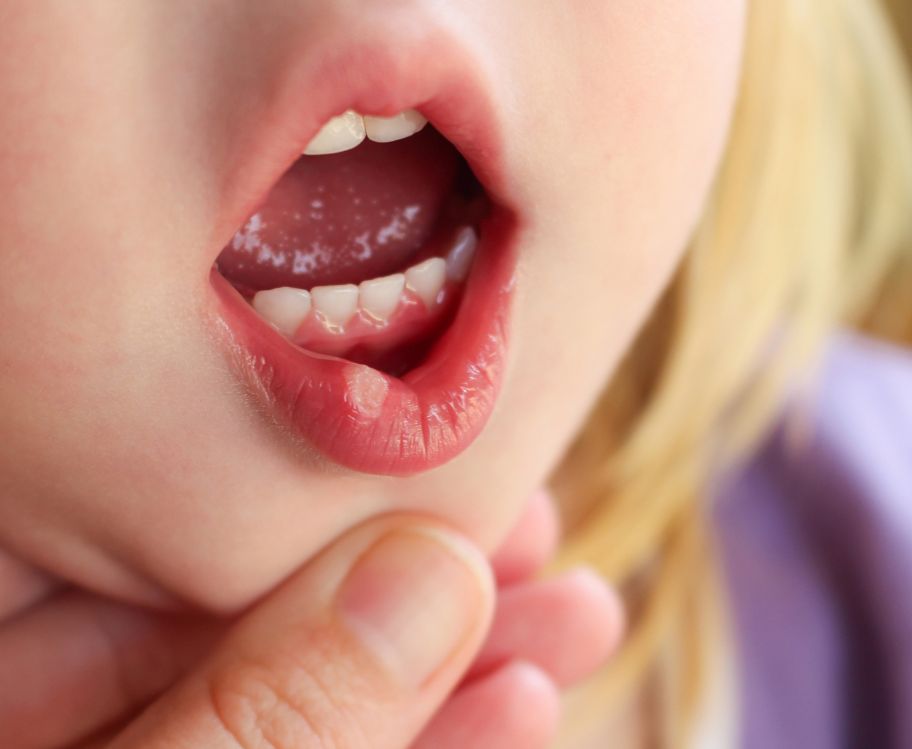
Oral thrush is a fungal infection of the mouth caused by a yeast called Candida. It is usually harmless and is not contagious. It is common condition, especially in newborn babies, with one in seven developing symptoms by four weeks.
Symptoms
The main symptom of thrush is usually white patches (plaques) in the mouth that can often be wiped off, leaving behind red areas. You may also develop sore, cracked, red areas at the corners of your lips called angular stomatitis. In some people, their sense of taste may also be affected.
Causes
Low numbers of Candida are naturally found in the mouth and digestive system of most people without causing any problems. It is only if they multiply that people will develop symptoms of thrush. The most common reasons for this to occur are:
 Babies immune systems are not fully developed and are not able to fight off the Candida infection.
Babies immune systems are not fully developed and are not able to fight off the Candida infection.
 Antibiotics kill bacteria in the mouth which allows the Candida to multiply causing symptoms.
Antibiotics kill bacteria in the mouth which allows the Candida to multiply causing symptoms.
 Poorly fitting dentures rubbing on the gums.
Poorly fitting dentures rubbing on the gums.
 Using steroid inhalers to treat asthma.
Using steroid inhalers to treat asthma.
 Having a dry mouth (xerostomia), due to a lack of saliva.
Having a dry mouth (xerostomia), due to a lack of saliva.
 Smoking.
Smoking.
 Having a lowered immune system e.g. if undergoing treatment for cancer.
Having a lowered immune system e.g. if undergoing treatment for cancer.
Treatment
Topical treatments that are applied to the affected areas of the mouth and are the most commonly used treatment for oral thrush. Miconazole gel (Daktarin oral gel) is available over-the-counter in your totalhealth pharmacy for treatment of adults and babies from four months, or your doctor may prescribe Nystatin drops (Mycostatin). These are applied to the affected area four times a day for seven to fourteen days. You should not eat or drink for about 30 minutes after applying the gel/drops, and they should be given to babies after they have had a feed to prevent the medicine being washed out of the mouth.
Your doctor may also prescribe Fluconazole. This is an oral capsule and is often used if topical treatments are not effective or for patients with a lowered immune system e.g. undergoing chemotherapy treatment.
totalhealth pharmacist's advice
There are a number of things you can do to reduce the chances of developing oral thrush:
 Rinsing your mouth after meals.
Rinsing your mouth after meals.
 Brushing your teeth twice a day with a toothpaste that contains fluoride and interden-tal cleaning (flossing) regularly.
Brushing your teeth twice a day with a toothpaste that contains fluoride and interden-tal cleaning (flossing) regularly.
 Visiting your dentist for regular check-ups.
Visiting your dentist for regular check-ups.
 Stopping smoking.
Stopping smoking.
 If you have diabetes - good control of your blood sugar level reduces the risk of thrush and other infections.
If you have diabetes - good control of your blood sugar level reduces the risk of thrush and other infections.
 If you wear dentures:
If you wear dentures:
 Leave your dentures out overnight, or for at least six hours daily. Constant wearing of dentures, and not taking them out at night, is thought to be one of the most common causes of oral thrush.
Leave your dentures out overnight, or for at least six hours daily. Constant wearing of dentures, and not taking them out at night, is thought to be one of the most common causes of oral thrush.
 Clean and disinfect dentures daily. To clean, use soapy water and scrub the dentures with a soft nailbrush on the fitting surface. Then soak them in a disinfecting solution. Rinse the dentures after disinfecting them, and then allow the dentures to air dry before wearing them again. Drying like this helps to kill any Candida that might be stuck to the dentures.
Clean and disinfect dentures daily. To clean, use soapy water and scrub the dentures with a soft nailbrush on the fitting surface. Then soak them in a disinfecting solution. Rinse the dentures after disinfecting them, and then allow the dentures to air dry before wearing them again. Drying like this helps to kill any Candida that might be stuck to the dentures.
 Clean the inside of your mouth (where the dentures sit) with a soft brush.
Clean the inside of your mouth (where the dentures sit) with a soft brush.
 See a dentist if the dentures do not fit well.
See a dentist if the dentures do not fit well.
 If you use steroid inhalers:
If you use steroid inhalers:
 Having a good inhaler technique and using a spacer device may reduce the risk of thrush. Ask your local totalhealth pharmacist to check your inhaler technique.
Having a good inhaler technique and using a spacer device may reduce the risk of thrush. Ask your local totalhealth pharmacist to check your inhaler technique.
 Rinse your mouth after using the inhaler, to help remove any medicine particles left in your mouth.
Rinse your mouth after using the inhaler, to help remove any medicine particles left in your mouth.
 For babies, ensure that all dummies, feeding equipment and any toys that your baby puts in their mouth are sterilised regularly.
For babies, ensure that all dummies, feeding equipment and any toys that your baby puts in their mouth are sterilised regularly.
Breastfeeding mothers
If you are breastfeeding any your baby has oral thrush, it's possible for your baby to pass the infection to you. Your nipples can become cracked, sore and sometimes red and shiny, caus-ing pain when feeding. You should continue to feed your baby as normal, however in addi-tion to treating the baby you should also use an antifungal cream such as miconazole (Daktarin) on your nipples after every feed. Remove any that is left before the next feed.